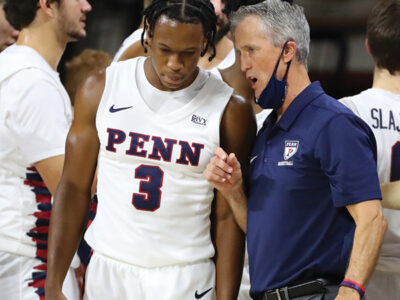Early this month, the members of Penn’s 1955 heavyweight crew gathered in Henley-on-Thames, England, to celebrate their 50th reunion. Unlike most reunions, this one required no mental editing to bring back a steady stream of joyful memories.
Coached by the legendary Joe Burk W’34 Hon’88 (see main story), the ’55 crew was widely regarded as the fastest in the world, and with good reason. Having defeated Princeton and Columbia for the Childs Cup, Yale and Columbia for the Blackwell Cup, and Harvard and Navy for the Adams Cup, the Penn crew sprinted past Cornell, Columbia, Yale, Princeton, and Navy at the Eastern Association of Rowing Colleges championships in Washington, then defeated Cornell and the University of Wisconsin at Madison. Its only setback was finishing second to Cornell at the Intercollegiate Rowing Association race.
But it would more than make up for that at the Henley Royal Regatta. There, after defeating Cornell, Navy, Harvard, Yale, Princeton, Columbia, Wisconsin, and the Thames Rowing Club, the crew swept past the Vancouver Rowing Club (University of British Columbia) by a third of a length to win the Grand Challenge Cup. It was only the fourth time in Regatta history that an American crew had won the Challenge, which began in 1839.
The crew members barely had time to grasp the magnitude of their victory when they were invited by the U.S. State Department to travel to Germany. There, according to an article by athletic-director Jeremiah Ford in the September 1955 Gazette, began “an incredible expedition to a series of German cities that saw the crew hailed as world champions and perform as such on at least two occasions.”
After victories in Hamburg and Essen (where they rowed the 2000-meter Baldeneysee course in near-record time), the crew traveled to Mannheim, and there “climaxed its epic performances of the year with a victory over Hansa, Heidelberg, Yugoslavia, and Austria. As oarsmen, our boys were the wonder of experts both in England and the Continent,” wrote Ford. “Movies were taken of them in action to capture the secret of their flawless technique. Their shell and oars were measured and weighed, their training regimen studied closely; because everywhere they competed, particularly in Germany, they were referred to as the world’s fastest crew and hence became models for local oarsmen.
“But it was as ambassadors of goodwill that they performed their best service to the State Department,” Ford noted. “They did more (and this comes from our German hosts) to establish in the minds of the rowing public—an elite group, remember—that America is vital, fresh, and capable of leadership, than years of propaganda and occupation have succeeded in doing.”
Ford wrote his dispatch while flying over the Alps and riding the Simplon-Orient express train from Milan to Venice. “If my tone seems excessively romantic or heady,” he concluded, “remember my surroundings and bear in mind that I am reporting the exploits of a Pennsylvania crew that may have been the best crew of all time.” In 1977 the crew was inducted into the Rowing Hall of Fame.—S.H.



